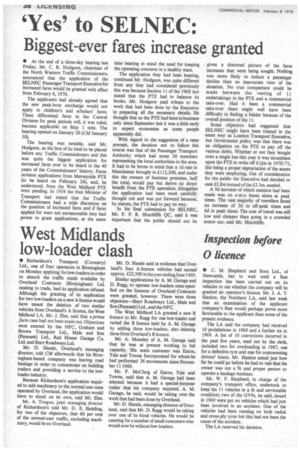'Yes' to SELNEC:
Page 40

If you've noticed an error in this article please click here to report it so we can fix it.
Biggest-ever fares increase granted
• At the end of a three-day hearing last Friday, Mr. C. R. Hodgson, chairman of the North Western Traffic Commissioners, announced that the application of the SELNEC Passenger Transport Executive for increased fares would be granted with effect from February 8, 1970.
The applicants had already agreed that the new peak-hour surcharge would not apply to children's and scholars' fares. These differential fares in the Central Division for peak periods will, it was ruled, become applicable on May 1 next_ The hearing opened on January 28 (CM January 30).
The hearing was notable, said Mr. Hodgson, as the first of its kind to be placed before any Traffic Commissioners and this was quite the biggest application for increased fares ever to be heard in the 40 years of the Commissioners' history. Fares revision applications from Merseyside PTE (to be heard on February 24), and, he understood, from the West Midland PTE were pending. In 1954 the then Minister of Transport had stated that the Traffic Commissioners had a wide discretion on the question of increased fares and if fares applied for were not unreasonable they had power to grant applications, at the same time bearing in mind the need for keeping the operating concerns in a healthy state.
The application they had been hearing, continued Mr. Hodgson, was quite different from any they had considered previously this was because Section 11 of the 1968 Act stated that the PTE had to balance its books. Mr. Hodgson paid tribute to the work that had been done by the Executive in preparing all the necessary details. He thought that as the PTE had been in business only since September last it was a little early to expect economies as some people apparently did.
With regard to the suggestion of a rates precept, the decision not to follow this course was that of the Passenger Transport Authority which had some 30 members representing the local authorities in the area. It had to be borne in mind that a id rate in Manchester brought in £112,300, and under this the owners of business premises, half the total, would pay but derive no direct benefit from the PTE operation. Altogether the application had been most carefully thought out and was put forward because, by statute, the PTE had to pay its way.
In his final submission for SELNEC, Mr. F. P. R. Hinchliffe QC, said it was important that the public should not be given a distorted picture of the fares increases that were being sought. Nothing was more likely to induce a passenger decline than an inaccurate view of the situation. No true comparison could be made between the vesting of 11 undertakings in the PTE and a commercial take-over. Had it been a commercial take-over there might well have been difficulty in finding a bidder because of the overall position of the II.
Some objectors had suggested that SELNEC might have been treated in the same way as London Transport Executive, but Government policy was that there was an obligation on the PTE to pay off the various debts. Whether or not they bought even a single bus this year it was incumbent upon the PTE to write off £ Ifni in 1970 /71, this being a proper depreciation of the assets they were employing. Out of consideration for the public the Executive had decided to seek £2.8m instead of the £3.3m. needed.
A 9d increase of which mention had been made was on o-m-o buses alone at peak times. The vast majority of travellers faced an increase of 3d in off-peak times and 6d in peak times. The cost of travel was still low and cheaper than going in a crowded motor car, said Mr. Hinchliffe.


















































































































































